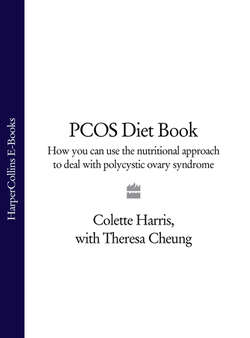Читать книгу PCOS Diet Book: How you can use the nutritional approach to deal with polycystic ovary syndrome - Theresa Cheung - Страница 5
Foreword
ОглавлениеWe now know that PCOS is a common condition that must have plagued women for generations. Only a decade ago it was barely recognized by medical practitioners, and most women would have suffered their symptoms in silence. At last, with greater understanding of its underlying causes, PCOS is now being taken seriously. Much of the credit for greater public awareness in the UK goes to Colette Harris and her previous book PCOS: A Woman’s Guide to Dealing with Polycystic Ovary Syndrome and for her tireless support for Verity, the PCOS support group.
As a scientist, nutritionist and medical herbalist I am impressed by how far Colette Harris and Theresa Francis-Cheung have delved into the scientific and medical literature to review what is currently known about PCOS and its treatment. In this book they present the information in an easy-to-read form, together with the voices of PCOS sufferers, with whom many women will identify. Sufferers can now see a rational basis for their diverse symptoms, founded on poor utilization of insulin. For example, this new concept goes a long way to explain why weight loss is so difficult for women with PCOS.
But help is at hand!
This book is full of tips on diet and lifestyle changes that can help the body to use insulin more efficiently. It shows how the vicious cycle of weight gain, with increasing difficulty of weight loss, can be broken, and that the debilitating and embarrassing signs and symptoms of PCOS really can disappear.
There is no doubt that, both from clinical data and from my own experience as a practitioner, switching to a healthy diet and adopting a healthy lifestyle would make a huge difference to the well-being of many people in the Western world. However, even with due attention to diet, many women do not reach their recommended target intakes for vitamins and minerals while on weight-reducing regimes. This is the dilemma faced by many women with PCOS, and is where nutrient supplements can be so very helpful. While they should never be a substitute for healthy eating, vitamin and mineral nutrition supplements can be used in conjunction with a good diet to ensure optimal nutrition of the key organs of the body involved in hormone balance.
Valuable guidance is given in this book on appropriate nutrient supplements, together with herbs that may be used to speed the way to health. However, since sufficient detail on the use of herbs cannot be conveyed in a book such as this, women with PCOS would benefit greatly from consulting a professional. If you want to consult a Medical Herbalist, look for the qualifications MNIMH or FNIMH (Member or Fellow of the National Institute of Medical Herbalists, UK) or MCPP (Member of the College of Practitioners of Phytotherapy, UK). These practitioners have had four years of rigorous medical training and will give sympathetic advice on PCOS. The addresses of these organizations are given at the back of the book.
There is no need to suffer in silence these days – if you have PCOS you can choose to have health and well-being. Although it will involve some effort, by following the advice given in this book you can make a positive difference to your own health and take control of your life again. It is an excellent guide to our current state of knowledge and is written from an integrated medical perspective by an ex-sufferer.
Dr Ann Walker PhD MNIMH MCPP
Senior Lecturer in Human Nutrition
Hugh Sinclair Unit of Human Nutrition School of Food Biosciences
The University of Reading, UK
27 September 2001
